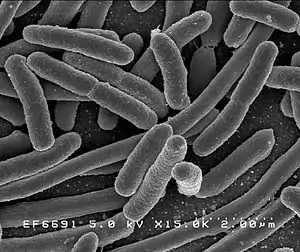Escherichia coli O104:H21
Escherichia coli O104:H21 is a rare serotype of Escherichia coli, a species of bacteria that lives in the lower intestines of mammals.[1] Although many serotypes of E. coli in animals are beneficial or do not cause disease , some serotypes of E. coli have been recognized as pathogenic to humans, e.g. E. coli O157:H7, E. coli O121 and E. coli O104:H21.
| Escherichia coli O104:H21 | |
|---|---|
 | |
| Scientific classification | |
| Domain: | |
| Phylum: | |
| Class: | |
| Order: | |
| Family: | |
| Genus: | |
| Species: | |
History
E. coli O104:H21 was discovered in 1982, when it caused an outbreak of severe bloody diarrhea. It had infected hamburgers, and those affected had eaten these hamburgers not fully cooked.[2]
An outbreak of E. coli responsible for at least 22 deaths in Northern Europe in May 2011 was reported to be caused by another O104 strain, Escherichia coli O104:H4.
Effects
E. coli O104:H21 can cause outbreak of infection similar to that caused by E. coli O157:H7, the most common shiga-like toxin-producing E. coli (SLTEC). SLTECs are the most well-known causes of gastrointestinal illness and diarrhea.[3]
Treatment
The body usually rids itself of harmful E. coli O104:H21 on its own within 5 to 10 days. Antibiotics should not be used, and neither should antidiarrheal agents such as loperamide.[2]
References
- "Laboratory-Confirmed Non-O157 Shiga Toxin Producing E. Coli". Centers for Disease Control and Prevention. Retrieved March 16, 2007.
- "Escherichia coli O157:H7". Centers for Disease Control and Prevention. Archived from the original on August 4, 2007. Retrieved August 1, 2007.
- "Outbreak of Acute Gastroenteritis Attributable to Escherichia coli Serotype O104:H21". Centers for Disease Control and Prevention. Retrieved July 31, 2007.